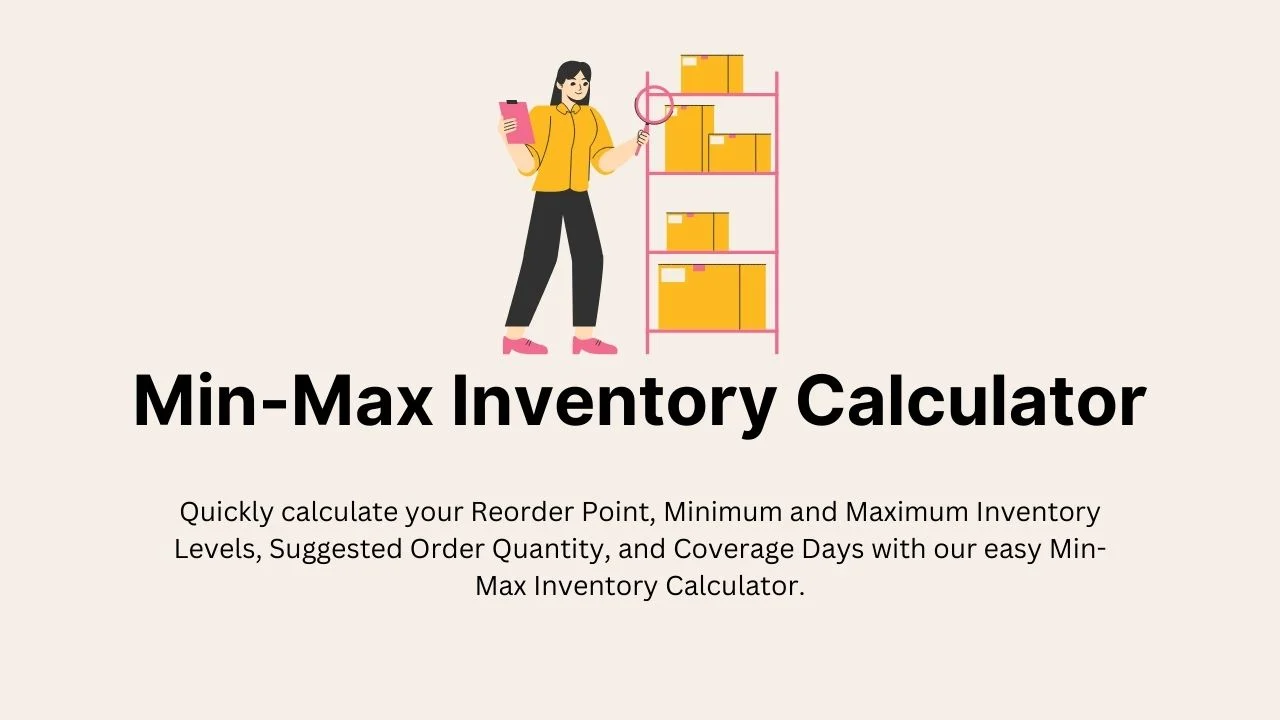Min-Max Inventory Calculator
Quickly calculate your Reorder Point, Minimum and Maximum Inventory Levels, Suggested Order Quantity, and Coverage Days with our easy Min-Max Inventory Calculator.
Order Recommendations
Formulas:
ROP = (Avg Usage × Lead Time) + Safety Stock
Min = Safety Stock Level
Max = ROP + (Avg Usage × Order Cycle)
Efficient inventory management is essential to ensure product availability while minimizing storage costs. The Min-Max Inventory Calculator is a powerful tool that helps businesses set optimal stock levels by defining a minimum (reorder point) and maximum inventory level. This approach helps avoid stockouts and overstocking, improving your supply chain efficiency.
What is a Min-Max Inventory System?
The Min-Max Inventory System is a method of inventory control where:
- The Minimum Level (Reorder Point) triggers a new order when stock falls to this point.
- The Maximum Level indicates the highest quantity that should be in stock after reordering.
The difference between the two helps you determine the reorder quantity needed.
Formulas and Equations
1. Safety Stock
Safety Stock is the extra quantity of inventory that you keep on hand to protect against unexpected events, like: Sudden increase in customer demand, Supplier delays, Shipping issues and Forecasting errors. It acts like a buffer so that even if something goes wrong, your business can continue selling products without running out of stock.
2. Reorder Point (ROP)
The Reorder Point (ROP) is the inventory level at which you should place a new order to avoid running out of stock.
3. Minimum Level
Minimum Level is the lowest quantity of stock that should be available in your inventory to avoid a stockout. It acts as a warning point — if stock falls below this level, urgent action is needed to reorder or restock.
4. Maximum Level
Maximum Level is the highest quantity of stock that you should ideally hold. It helps prevent overstocking, reduces storage costs, and ensures that you don’t tie up too much money in inventory.
5. Suggested Order Quantity
Suggested Order Quantity is the number of units you should order to refill your inventory up to the maximum level. It ensures you have enough stock without overloading your warehouse.
6. Coverage Days
Coverage Days tells you how many days your current stock will last based on your average daily usage. It helps you understand how soon you might need to reorder.
7. Stock Status Logic
- If Current Stock ≥ ROP → Healthy
- Else if Current Stock ≥ Min Level → Warning
- Else → Critical – Reorder Now!
Example Calculation
Let’s say:
- Average Daily Usage = 100 units
- Lead Time = 5 days
- Safety Stock (%) = 20%
- Order Cycle = 7 days
- Current Stock Level = 900 units
Step-by-Step:
1. Safety Stock:
2. ROP:
3. Min Level:
4. Max Level:
5. Order Quantity:
6. Coverage Days:
7. Stock Status:
Conclusion
This advanced Min-Max Inventory Calculator offers not just reorder points but a full breakdown of stock behavior, helping you:
- Prevent stockouts
- Reduce holding costs
- Optimize reorder schedules
- Understand your stock health instantly

Related Calculators
Help Improve This Tool
Your suggestions help us make better tools for everyone.